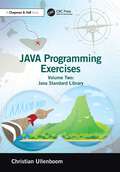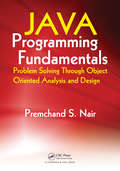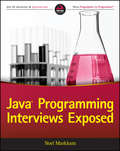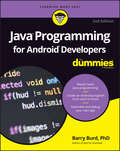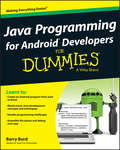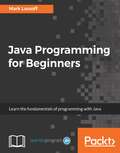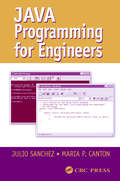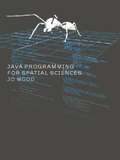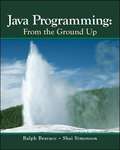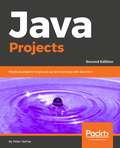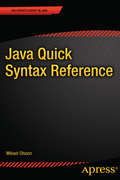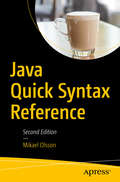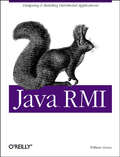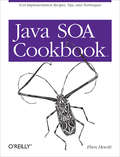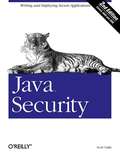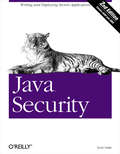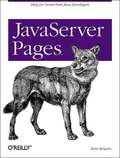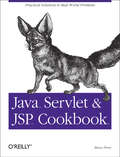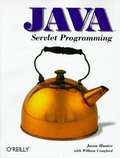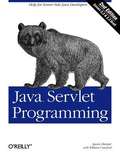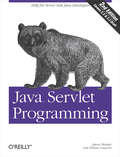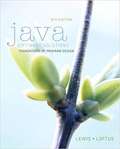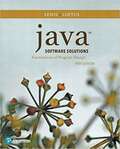- Table View
- List View
Java Programming Exercises: Volume Two: Java Standard Library
by Christian UllenboomTake the next step in raising your coding skills and dive into the intricacies of Java Standard Libraries. You will continue to raise your coding skills, and test your Java knowledge on tricky programming tasks, with the help of the pirate Captain CiaoCiao. This is the second of two volumes which provide you with everything you need to excel in your Java journey, including tricks that you should know in detail as a professional, as well as intensive training for clean code and thoughtful design that carries even complex software.Features: 149 tasks with commented solutions on different levels For all paradigms: object-oriented, imperative, and functional Clean code, reading foreign code, and object-oriented modeling With numerous best practices and extensively commented solutions to the tasks, these books provide the perfect workout for professional software development with Java.
Java Programming Fundamentals: Problem Solving Through Object Oriented Analysis and Design
by Premchand S. NairWhile Java texts are plentiful, it's difficult to find one that takes a real-world approach, and encourages novice programmers to build on their Java skills through practical exercise. Written by an expert with 19 experience teaching computer programming, Java Programming Fundamentals presents object-oriented programming by employing examples taken
Java Programming Interviews Exposed
by Noel MarkhamIf you are a skilled Java programmer but are concerned about the Java coding interview process, this real-world guide can help you land your next positionJava is a popular and powerful language that is a virtual requirement for businesses making use of IT in their daily operations. For Java programmers, this reality offers job security and a wealth of employment opportunities. But that perfect Java coding job won't be available if you can't ace the interview. If you are a Java programmer concerned about interviewing, Java Programming Interviews Exposed is a great resource to prepare for your next opportunity. Author Noel Markham is both an experienced Java developer and interviewer, and has loaded his book with real examples from interviews he has conducted.Review over 150 real-world Java interview questions you are likely to encounterPrepare for personality-based interviews as well as highly technical interviewsExplore related topics, such as middleware frameworks and server technologiesMake use of chapters individually for topic-specific help Use the appendix for tips on Scala and Groovy, two other languages that run on JVMsVeterans of the IT employment space know that interviewing for a Java programming position isn't as simple as sitting down and answering questions. The technical coding portion of the interview can be akin to a difficult puzzle or an interrogation. With Java Programming Interviews Exposed, skilled Java coders can prepare themselves for this daunting process and better arm themselves with the knowledge and interviewing skills necessary to succeed.
Java Programming for Android Developers For Dummies
by Barry A. BurdDevelop the next killer Android App using Java programming! Android is everywhere! It runs more than half the smartphones in the U.S.--and Java makes it go. If you want to cash in on its popularity by learning to build Android apps with Java, all the easy-to-follow guidance you need to get started is at your fingertips. Inside, you'll learn the basics of Java and grasp how it works with Android; then, you'll go on to create your first real, working application. How cool is that? The demand for Android apps isn't showing any signs of slowing, but if you're a mobile developer who wants to get in on the action, it's vital that you get the necessary Java background to be a success. With the help of Java Programming for Android Developers For Dummies, you'll quickly and painlessly discover the ins and outs of using Java to create groundbreaking Android apps--no prior knowledge or experience required! Get the know-how to create an Android program from the ground up Make sense of basic Java development concepts and techniques Develop the skills to handle programming challenges Find out how to debug your app Don't sit back and watch other developers release apps that bring in the bucks! Everything you need to create that next killer Android app is just a page away!
Java Programming for Android Developers For Dummies
by BurdGet started creating Android apps with Java in no time!The demand for Android apps is not slowing down but many mobile developers who want to create Android apps lack the necessary Java background. This beginner guide gets you up and running with using Java to create Android apps with no prior knowledge or experienced necessary!Shows you the basic Java development concepts and techniques that are necessary to develop Android appsExplores what goes into creating an Android app to give you a better understanding of the various elementsAddresses how to deal with standard programming challenges and debuggingBeginning Android Programming with Java For Dummies puts you well on your way toward creating Android apps quickly with Java.
Java Programming for Beginners
by Mark LassoffJava Programming for Beginners is an introduction to Java programming, taking you through the Java syntax and the fundamentals of object-oriented programming. About This Book • Learn the basics of Java programming in a step-by-step manner • Simple, yet thorough steps that beginners can follow • Teaches you transferable skills, such as flow control and object-oriented programming Who This Book Is For This book is for anyone wanting to start learning the Java language, whether you're a student, casual learner, or existing programmer looking to add a new language to your skillset. No previous experience of Java or programming in general is required. What You Will Learn • Learn the core Java language for both Java 8 and Java 9 • Set up your Java programming environment in the most efficient way • Get to know the basic syntax of Java • Understand object-oriented programming and the benefits that it can bring • Familiarize yourself with the workings of some of Java's core classes • Design and develop a basic GUI • Use industry-standard XML for passing data between applications In Detail Java is an object-oriented programming language, and is one of the most widely accepted languages because of its design and programming features, particularly in its promise that you can write a program once and run it anywhere. Java Programming for Beginners is an excellent introduction to the world of Java programming, taking you through the basics of Java syntax and the complexities of object-oriented programming. You'll gain a full understanding of Java SE programming and will be able to write Java programs with graphical user interfaces that run on PC, Mac, or Linux machines. This book is full of informative and entertaining content, challenging exercises, and dozens of code examples you can run and learn from. By reading this book, you'll move from understanding the data types in Java, through loops and conditionals, and on to functions, classes, and file handling. The book finishes with a look at GUI development and training on how to work with XML. The book takes an efficient route through the Java landscape, covering all of the core topics that a Java developer needs. Whether you're an absolute beginner to programming, or a seasoned programmer approaching an object-oriented language for the first time, Java Programming for Beginners delivers the focused training you need to become a Java developer. Style and approach This book takes a very hands-on approach, carefully building on lessons learned with snippets and tutorials to build real projects.
Java Programming for Engineers
by Julio Sanchez Maria P. CantonWhile teaching Java programming at Minnesota State University, the authors noticed that engineering students were enrolling in Java programming courses in order to obtain basic programming skills, but there were no Java books suitable for courses intended for engineers. They realized the need for a comprehensive Java programming tutorial that offer
Java Programming for Spatial Sciences
by Jo WoodThe Java programming language has been one of the most exciting internet-friendly technologies to emerge in the last decade. Java Programming for Spatial Sciences introduces the subject to those who wish to use computers to handle information with a geographical element.The book introduces object-oriented modeling including key concepts suc
Java Programming with Oracle JDBC
by Donald BalesLearn how to leverage JDBC, a key Java technology used to access relational data from Java programs, in an Oracle environment. Author Donald Bales begins by teaching you the mysteries of establishing database connections, and how to issue SQL queries and get results back. You'll move on to advanced topics such as streaming large objects, calling PL/SQL procedures, and working with Oracle9i's object-oriented features, then finish with a look at transactions, concurrency management, and performance.
Java Programming: From the Ground Up
by Ralph Bravaco Shai SimonsonJava Programming, From The Ground Up, with its flexible organization, teaches Java in a way that is refreshing, fun, interesting and still has all the appropriate programming pieces for students to learn. The motivation behind this writing is to bring a logical, readable, entertaining approach to keep your students involved. Each chapter has a Bigger Picture section at the end of the chapter to provide a variety of interesting related topics in computer science. The writing style is conversational and not overly technical so it addresses programming concepts appropriately. Because of the flexibile organization of the text, it can be used for a one or two semester introductory Java programming class, as well as using Java as a second language. The text contains a large variety of carefully designed exercises that are more effective than the competition.
Java Projects: Learn the fundamentals of Java 11 programming by building industry grade practical projects, 2nd Edition
by Peter VerhasLearn how to build scalable, resilient, and effective applications in Java that suit your software requirements.Key FeaturesExplore advanced technologies that Java 11 delivers such as web programming and parallel computingDiscover modern programming paradigms such as microservices, cloud computing and enterprise structuresBuild highly responsive applications with this practical introduction to Reactive programmingBook DescriptionJava is one of the most commonly used software languages by programmers and developers. In this book, you’ll learn the new features of Java 11 quickly and experience a simple and powerful approach to software development. You’ll see how to use the Java runtime tools, understand the Java environment, and create a simple namesorting Java application. Further on, you'll learn about advanced technologies that Java delivers, such as web programming and parallel computing, and will develop a mastermind game. Moving on, we provide more simple examples, to build a foundation before diving into some complex data structure problems that will solidify your Java 11 skills. With a special focus on the features of new projects: Project Valhalla, Project Panama, Project Amber, and Project Loom, this book will help you get employed as a top-notch Java developer. By the end of the book, you’ll have a firm foundation to continue your journey toward becoming a professional Java developer.What you will learnCompile, package, and run a program using a build management toolGet to know the principles of test-driven developmentSeparate the wiring of multiple modules from application logicUse Java annotations for configurationMaster the scripting API built into the Java languageUnderstand static versus dynamic implementation of codeWho this book is forThis book is for anyone who wants to learn the Java programming language. No programming experience required. If you have prior experience, it will help you through the book more easily.
Java Quick Syntax Reference
by Mikael OlssonThe Java Quick Syntax Reference is a condensed code and syntax reference to the Java programming language. It presents the essential Java syntax in a well-organized format that can be used as a handy reference. You won't find any technical jargon, bloated samples, drawn out history lessons or witty stories in this book. What you will find is a language reference that is concise, to the point and highly accessible. The book is packed with useful information and is a must-have for any Java programmer. In the Java Quick Syntax Reference, you will find: A comprehensive reference to the Java language syntax. Short, simple and focused code examples. A well laid out table of contents and a comprehensive index allowing easy review.
Java Quick Syntax Reference
by Mikael OlssonThe Java Quick Syntax Reference is a condensed code and syntax reference to the Java programming language. It presents the essential Java syntax in a well-organized format that can be used as a handy reference. You won't find any technical jargon, bloated samples, drawn out history lessons or witty stories in this book. What you will find is a language reference that is concise, to the point and highly accessible. The book is packed with useful information and is a must-have for any Java programmer. In the Java Quick Syntax Reference, you will find: A concise reference to the Java language syntax Short, simple and focused code examples A well laid out table of contents and a comprehensive index allowing easy review
Java RMI: Designing & Building Distributed Applications
by William GrossoJava RMI contains a wealth of experience in designing and implementing Java's Remote Method Invocation. If you're a novice reader, you will quickly be brought up to speed on why RMI is such a powerful yet easy to use tool for distributed programming, while experts can gain valuable experience for constructing their own enterprise and distributed systems.With Java RMI, you'll learn tips and tricks for making your RMI code excel. The book also provides strategies for working with serialization, threading, the RMI registry, sockets and socket factories, activation, dynamic class downloading, HTTP tunneling, distributed garbage collection, JNDI, and CORBA. In short, a treasure trove of valuable RMI knowledge packed into one book.
Java SOA Cookbook: SOA Implementation Recipes, Tips, and Techniques
by Eben HewittJava SOA Cookbook offers practical solutions and advice to programmers charged with implementing a service-oriented architecture (SOA) in their organization. Instead of providing another conceptual, high-level view of SOA, this cookbook shows you how to make SOA work. It's full of Java and XML code you can insert directly into your applications and recipes you can apply right away.The book focuses primarily on the use of free and open source Java Web Services technologies -- including Java SE 6 and Java EE 5 tools -- but you'll find tips for using commercially available tools as well. Java SOA Cookbook will help you:Construct XML vocabularies and data models appropriate to SOA applicationsBuild real-world web services using the latest Java standards, including JAX-WS 2.1 and JAX-RS 1.0 for RESTful web servicesIntegrate applications from popular service providers using SOAP, POX, and AtomCreate service orchestrations with complete coverage of the WS-BPEL (Business Process Execution Language) 2.0 standardImprove the reliability of SOAP-based services with specifications such as WS-Reliable MessagingDeal with governance, interoperability, and quality-of-service issuesThe recipes in Java SOA Cookbook will equip you with the knowledge you need to approach SOA as an integration challenge, not an obstacle.
Java Security, 2nd Edition
by Scott OaksThe second edition focuses on the platform features of Java that provide security--the class loader, bytecode verifier, and security manager--and recent additions to Java that enhance this security model: digital signatures, security providers, and the access controller. The book covers in depth the security model of Java 2, version 1.3, including the two new security APIs: JAAS and JSSE.
Java Security, 2nd Edition
by Scott OaksOne of Java's most striking claims is that it provides a secure programming environment. Yet despite endless discussion, few people understand precisely what Java's claims mean and how it backs up those claims. If you're a developer, network administrator or anyone else who must understand or work with Java's security mechanisms, Java Security is the in-depth exploration you need. Java Security, 2nd Edition, focuses on the basic platform features of Java that provide security--the class loader, the bytecode verifier, and the security manager--and recent additions to Java that enhance this security model: digital signatures, security providers, and the access controller. The book covers the security model of Java 2, Version 1.3, which is significantly different from that of Java 1.1. It has extensive coverage of the two new important security APIs: JAAS (Java Authentication and Authorization Service) and JSSE (Java Secure Sockets Extension). Java Security, 2nd Edition, will give you a clear understanding of the architecture of Java's security model and how to use that model in both programming and administration. The book is intended primarily for programmers who want to write secure Java applications. However, it is also an excellent resource for system and network administrators who are interested in Java security, particularly those who are interested in assessing the risk of using Java and need to understand how the security model works in order to assess whether or not Java meets their security needs.
Java Security: Writing and Deploying Secure Applications
by Scott OaksOne of Java's most striking claims is that it provides a secure programming environment. Yet despite endless discussion, few people understand precisely what Java's claims mean and how it backs up those claims. If you're a developer, network administrator or anyone else who must understand or work with Java's security mechanisms, Java Security is the in-depth exploration you need.Java Security, 2nd Edition, focuses on the basic platform features of Java that provide security--the class loader, the bytecode verifier, and the security manager--and recent additions to Java that enhance this security model: digital signatures, security providers, and the access controller. The book covers the security model of Java 2, Version 1.3, which is significantly different from that of Java 1.1. It has extensive coverage of the two new important security APIs: JAAS (Java Authentication and Authorization Service) and JSSE (Java Secure Sockets Extension). Java Security, 2nd Edition, will give you a clear understanding of the architecture of Java's security model and how to use that model in both programming and administration.The book is intended primarily for programmers who want to write secure Java applications. However, it is also an excellent resource for system and network administrators who are interested in Java security, particularly those who are interested in assessing the risk of using Java and need to understand how the security model works in order to assess whether or not Java meets their security needs.
Java Server Pages
by Hans BergstenJavaServer Pages (JSP) technology provides an easy way to create dynamic web pages. JSP uses a component-based approach that allows web developers to easily combine static HTML for look-and-feel with Java components for dynamic features. The simplicity of this component-based model, combined with the cross-platform power of Java, allows a web development environment with enormous potential. JavaServer Pages shows how to develop Java-based web applications without having to be a hardcore programmer. The author provides an overview of JSP concepts and discusses how JSP fits into the larger picture of web applications. Web page authors will benefit from the chapters on generating dynamic content, handling session information, accessing databases, authenticating users, and personalizing content. In the programming-oriented chapters, Java programmers learn how to create Java components and custom JSP tags for web authors to use in JSP pages.
Java Servlet & JSP Cookbook: Practical Solutions to Real World Problems
by Bruce W. PerryWith literally hundreds of examples and thousands of lines of code, the Java Servlet and JSP Cookbook yields tips and techniques that any Java web developer who uses JavaServer Pages or servlets will use every day, along with full-fledged solutions to significant web application development problems that developers can insert directly into their own applications.Java Servlet and JSP Cookbook presents real-world problems, and provides concise, practical solutions to each. Finding even one tested code "recipe" that solves a gnarly problem in this comprehensive collection of solutions and best practices will save hours of frustration--easily justifying the cost of this invaluable book.But "Java Servlet and JSP Cookbook" is more than just a wealth of cut-and-paste code. It also offers clear explanations of how and why the code works, warns of potential pitfalls, and directs you to sources of additional information, so you can learn to adapt the problem-solving techniques to similar situations.These recipes include vital topics like the use of Ant to setup a build environment, extensive coverage of the WAR file format and web.xml deployment descriptor, file-uploading, error-handling, cookies, logging, dealing with non-HTML content, multimedia, request filtering, web services, I18N, web services, and a host of other topics that frustrate even the most seasoned developers.For Java web developers of all levels who are eager to put into practice the theory presented in other API-focused books, the solutions presented in this practical book will prove invaluable over and over again. This is painless way for less experienced developers who prefer to learn by doing to expand their skills and productivity, while accomplishing practical solutions to the pressing problems they face every day. More experienced developers can use these recipes to solve time-consuming problems quickly, freeing up their time for the more creative aspects of their work.
Java Servlet Programming
by Jason HunterA few years ago, the hype surrounding applets put Java on the map as a programming language for the Web. Today, Java servlets stand poised to take Java to the next level as a Web development language. The main reason is that servlets offer a fast, powerful, portable replacement for CGI scripts. The Java Servlet API, introduced as the first standard extension to Java, provides a generic mechanism to extend the functionality of any kind of server. Servlets are most commonly used, however, to extend Web servers, performing tasks traditionally handled by CGI programs. Web servers that can support servlets include: Apache, Netscape's FastTrack and Enterprise Servers, Microsoft's IIS, O'Reilly's WebSite, and JavaSoft's Java Web Server. The beauty of servlets is that they execute within the Web server's process space and they persist between invocations. This gives servlets tremendous performance benefits over CGI programs. Yet because they're written in Java, servlets are far less likely to crash a Web server than a C-based NSAPI or ISAPI extension. Servlets have full access to the various Java APIs and to third-party component classes, making them ideal for use in communicating with applets, databases, and RMI servers. Plus, servlets are portable between operating systems and between servers -- with servlets you can "write once, serve everywhere." Java Servlet Programming covers everything you need to know to write effective servlets and includes numerous examples that you can use as the basis for your own servlets. The book explains the servlet life cycle, showing how you can use servlets to maintain state information effortlessly. It also describes how to serve dynamic Web content, including both HTML pages and multimedia data. Finally, it explores more advanced topics like integrated session tracking, efficient database connectivity using JDBC, applet-servlet communication, inter-servlet communication, and internationalization.
Java Servlet Programming, 2nd Edition
by Jason HunterThe second edition of this popular book has been completely updated to add the new features of the Java Servlet API Version 2.2, and new chapters on servlet security and advanced communication. In addition to complete coverage of the 2.2 specification, we have included bonus material on the new 2.3 version of the specification.
Java Servlet Programming: Help for Server Side Java Developers
by William Crawford Jason HunterServlets are an exciting and important technology that ties Java to the Web, allowing programmers to write Java programs that create dynamic web content.Java Servlet Programming covers everything Java developers need to know to write effective servlets. It explains the servlet lifecycle, showing how to use servlets to maintain state information effortlessly. It also describes how to serve dynamic web content, including both HTML pages and multimedia data, and explores more advanced topics like integrated session tracking, efficient database connectivity using JDBC, applet-servlet communicaton, interservlet communication, and internationalization. Readers can use the book's numerous real-world examples as the basis for their own servlets.The second edition has been completely updated to cover the new features of Version 2.2 of the Java Servlet API. It introduces chapters on servlet security and advanced communication, and also introduces several popular tools for easier integration of servlet technology with dynamic web pages. These tools include JavaServer Pages (JSP), Tea, XMLC, and the Element Construction Set.In addition to complete coverage of 2.2 specification, Java Servlet programming, 2nd Edition, also contains coverage of the new 2.3 final draft specification.
Java Software Solutions
by John Lewis William LoftusJava Software Solutions teaches a foundation of programming techniques to foster well-designed object-oriented software. Heralded for its integration of small and large realistic examples, this worldwide best-selling text emphasizes building solid problem-solving and design skills to write high-quality programs.
Java Software Solutions
by John Lewis William LoftusJava Software Solutions establishes a strong foundation of programming techniques to foster well-designed object-oriented software. Heralded for its integration of small and large real-world examples, the worldwide best-selling text emphasizes problem-solving and design skills and introduces students to the process of constructing high-quality software systems. <p><p>The 9th Edition features a sweeping overhaul of Graphics Track coverage, to fully embrace the JavaFX API. This fresh approach enriches programmers’ understandings of core object-oriented principles. The text uses a natural progression of concepts, focusing on the use of objects before teaching how to write them–equipping students with the knowledge and skill they need to design true object-oriented solutions.
